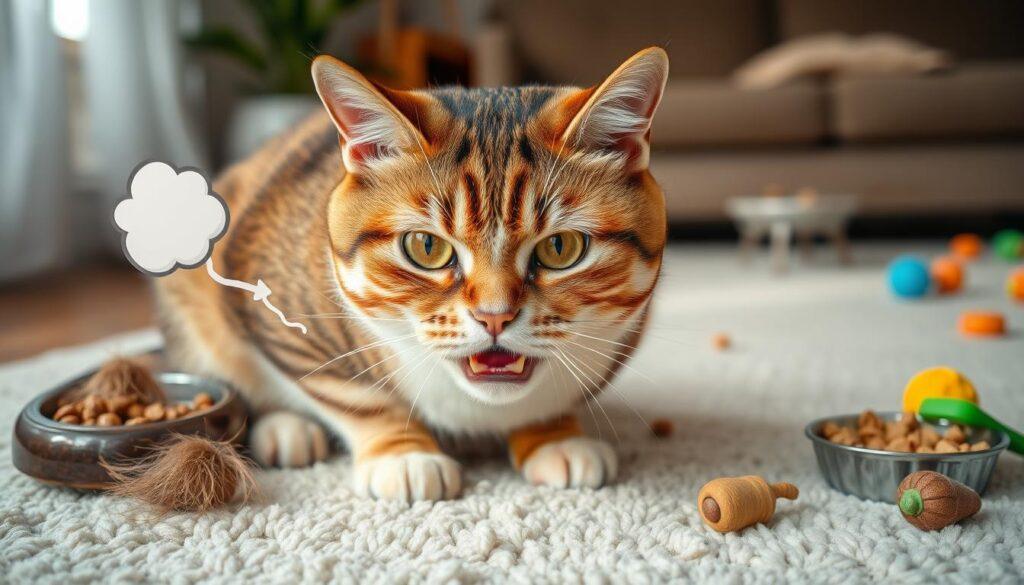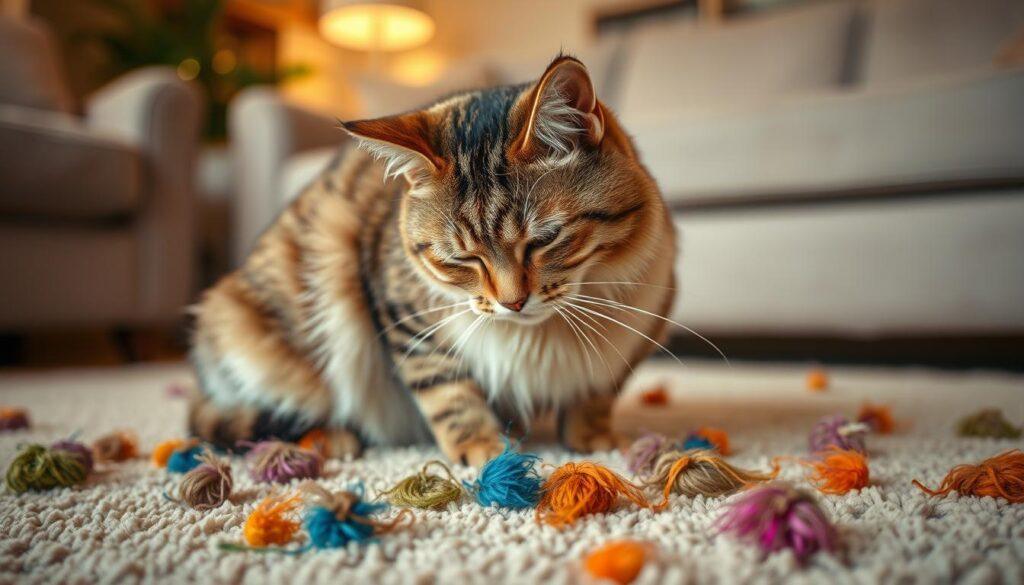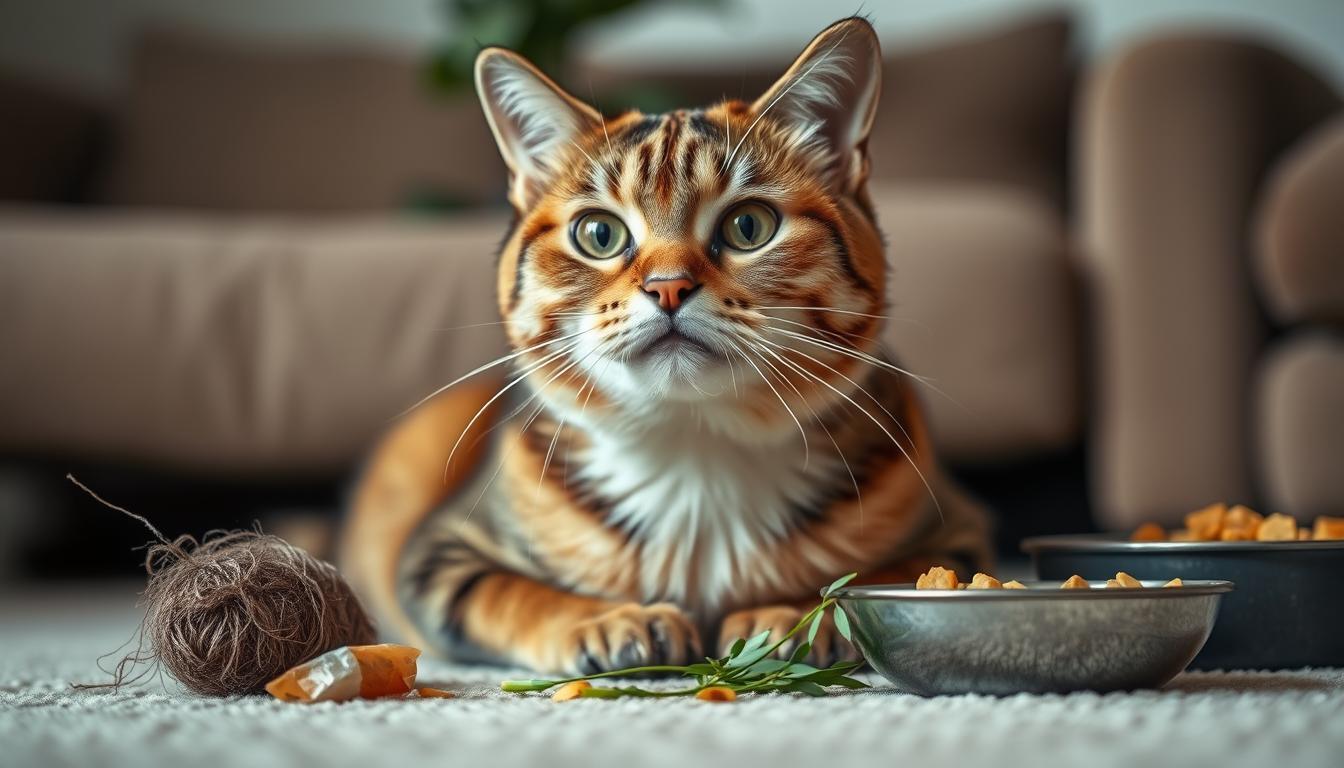As a pet owner, you might have seen your cat dry heaving. This is also known as feline regurgitation or cat gagging. While it’s normal sometimes, if it happens a lot, it could mean your cat is sick.
Dry heaving can be due to many things. It could be hairballs, which are common, or something more serious like kidney or liver disease. Cats can also get sick from eating things they shouldn’t.
Gastroenteritis, or inflammation of the stomach or intestine, can also cause dry heaving. This condition makes cats gag, heave, and vomit. It can also make them feel tired and have diarrhea.
In older cats, kidney disease is a big problem. It can make them feel sick, weak, and have trouble breathing. Liver disease is another issue that can cause dry heaving and make cats feel tired and lose weight.
Nausea can also make cats dry heave. It’s often caused by eating too much or eating bad food. If it keeps happening, it might mean something serious is wrong.
Foreign bodies in the stomach or throat can block things and cause dry heaving. This can make cats not want to eat and can hurt their belly. In bad cases, it can even hurt their breathing and they need to see a vet right away.
Key Takeaways
- Dry heaving in cats can be caused by various factors, including hairballs, gastroenteritis, kidney disease, heart disease, liver disease, and foreign body obstructions.
- Hairballs are the most common cause of dry heaving in cats and can affect both kittens and adult felines.
- Gastroenteritis, an inflammation of the stomach or intestine, can lead to dry heaving, vomiting, diarrhea, and loss of appetite.
- Older cats are more prone to kidney disease, which can cause dry heaving, nausea, and vomiting.
- Frequent or persistent dry heaving accompanied by other symptoms like lethargy, weight loss, and breathing difficulty may indicate a serious underlying condition that requires veterinary attention.
Understanding Feline Dry Heaving
Watching your cat dry heave can be scary. Dry heaving, or non-productive retching, is common in cats. It’s important to know what it is and how to spot the signs to keep your cat healthy.
What Is Dry Heaving in Cats?
Dry heaving in cats, also known as feline regurgitation, means they try to vomit but nothing comes out. They might gag, retch, or make hacking sounds. Hairballs are the main cause of cat gagging12, but it can also mean there’s a health problem.

Even though it looks scary, dry heaving is usually okay, especially if it’s from hairballs. But, if your cat does it a lot or keeps doing it, it might be serious and needs a vet.
Recognizing the Symptoms of Dry Heaving
To spot dry heaving in your cat, look for these signs:
- They try to vomit but nothing comes out
- Gagging, retching, or hacking sounds
- The back hunches and the neck stretches during episodes
- A “cough-like” noise
Also, watch for other signs that might mean something serious is going on, like:
- Not wanting to eat
- Feeling tired and weak
- Having trouble going to the bathroom
- Having trouble breathing
Even though dry heaving is usually not a big deal, it’s important to watch your cat’s health. Nausea can make cats gag12. If your cat’s dry heaving is often or seems bad, see a vet right away.
Knowing the signs of feline dry heaving helps you figure out when your cat needs a vet.
While dry heaving is usually okay, it can sometimes mean something serious. Keeping up with your cat’s health is important to make sure they stay happy and healthy.
Common Causes of Dry Heaving in Cats
As a cat owner, knowing why your cat might dry heave is key. Sometimes, it’s just a minor issue, but often, it’s a sign of a bigger problem. Let’s look at the main reasons for dry heaving in cats, like hairballs, nausea, and gastroenteritis.

Hairballs and Furballs
Furballs or hairballs are a big reason for dry heaving in cats34. Cats groom by swallowing hair, which can sometimes form a hairball. Trying to get rid of this can cause them to hack, gag, or dry heave.
For cats with hairballs, special cat food or products like hairball gels, cat grass, and treats can help5.
Nausea and Upset Stomach
Cats can get nausea and upset stomachs just like people, leading to dry heaving34. This can happen from eating too much, spoiled food, or too much stomach acid. If your cat keeps vomiting or seems tired, it’s time to see a vet3.
Gastroenteritis and Intestinal Inflammation
Gastroenteritis, or inflammation of the stomach or intestine, can make cats gag and dry heave34. It can be caused by infections, diseases, or reactions to new foods or meds5. Symptoms include diarrhea, not wanting to eat, and feeling tired or depressed. If your cat is gagging after meals, it might have gastroenteritis3.
| Cause | Symptoms |
|---|---|
| Hairballs | Hacking, gagging, dry heaving, retching |
| Nausea | Dry heaving, vomiting, lack of energy, abdominal pain, fever |
| Gastroenteritis | Gagging, dry heaving, vomiting, foaming at the mouth, diarrhea, reluctance to eat, lack of energy, depression |
Knowing the common causes of dry heaving in cats helps you spot problems early. If your cat’s dry heaving doesn’t go away or comes with other bad signs, see a vet. They can help your cat feel better.
Serious Health Concerns Related to Dry Heaving
While cats sometimes dry heave without worry, it’s a different story if it happens often. Health problems like kidney, heart, and liver disease can cause this symptom. These issues need quick attention from a vet.
Feline Kidney Disease
Kidney problems are common in older cats. They might show signs like dry heaving, nausea, and vomiting6. Cats with kidney disease also drink more water, itch, feel weak, and have pale gums. If your cat eats something toxic, it’s a vet emergency7.
Heart Disease in Cats
Heart issues, both inherited and acquired, are common in cats. They can lead to dry heaving, feeling weak, and trouble breathing6. Cats with heart problems might also wheeze, cough, have a swollen belly, and feel very tired7. If your cat shows these signs, see a vet right away.
Liver Disease and Its Symptoms
The liver is key for storing vitamins and filtering toxins. Liver disease often comes from infections or toxins. Cats with liver disease may dry heave, have yellow eyes and skin, pale gums, and drink more water67.
| Health Concern | Common Symptoms |
|---|---|
| Kidney Disease | Dry heaving, nausea, vomiting, increased thirst and urination, itchiness, depression, weakness, pale gums |
| Heart Disease | Dry heaving, weakness, difficulty breathing, wheezing, coughing, abdominal swelling, abnormal heart rate, low energy |
| Liver Disease | Dry heaving, jaundice, pale gums, increased thirst, lethargy, lack of appetite, weight loss, distended abdomen |
If your cat keeps dry heaving and shows other symptoms, get vet help fast. This can help find and treat health problems early.
Foreign Objects and Obstructions
Cats are naturally curious and often swallow things they shouldn’t. This can cause blockages in their throat, esophagus, or intestine. Common items include thread, hair bands, bones, and even Christmas tree decorations8. These blockages are a serious issue in veterinary care9.
If your cat is dry heaving or vomiting a lot, it’s time to call the vet. Signs like not wanting to eat, abdominal pain, or swelling are also red flags. Cats may also show diarrhea, lethargy, or changes in behavior9.
Vets use X-rays, ultrasound, and blood tests to find out what’s wrong. Surgery is often needed to remove the blockage. Cats may need IV fluids and hospital care9. The cost can be high, ranging from $800 to over $5,0008.
The outcome depends on the blockage’s location and the cat’s health before it happened. A blockage is a serious emergency. It needs quick attention to avoid dehydration or complete blockage, which can be deadly.
When to Seek Veterinary Care for Your Cat’s Dry Heaving
While cats sometimes dry heave, especially from hairballs, it’s usually not a big deal. But, if your cat keeps doing it and shows other signs, it might be serious. It’s important to know the cat dry heaving warning signs and when to get vet help for your cat.
Signs of a Serious Underlying Condition
Watch your cat closely for any extra signs that could mean a big health problem. Look out for these cat emergency symptoms:
- Loss of appetite
- Lethargy and lack of energy
- Constipation or diarrhea
- Pale gums
- Increased thirst
- Weakness or difficulty moving
- Abdominal pain or swelling
- Difficulty breathing
Older cats (10 years and up) often face kidney and disease issues10. Kidney disease can cause vomiting because the kidneys can’t filter toxins well11. Heart disease might show up as breathing problems and an odd heart rate10. Liver disease can happen from infections, toxins, or just getting older10.
Importance of Early Intervention
Cat early diagnosis and feline prompt treatment are key when serious health issues arise. If your cat shows these symptoms and dry heaving, call your vet right away. Quick action can greatly improve treatment success.
Regular vet visits and cat health monitoring can catch problems early. If your cat has a blockage in their throat, esophagus, or stomach, get vet help fast10. Even a few coughs or vomits might need vet care, like if they’re sneezing too11.
Your vet is the best person to talk to about feline health concerns. If you see any worrying signs or changes in your cat, call them. Quick action can really help your pet’s health.
Home Remedies and Preventive Measures
Managing your cat’s dry heaving and vomiting can be done at home. There are many effective ways to reduce hairballs and prevent your cat from eating foreign objects. These steps help keep your cat healthy and happy.
Managing Hairballs with Grooming and Diet
Regular grooming can help reduce hairballs in cats. Brushing your cat’s coat removes loose hair and dead hair12. This also keeps their coat shiny and healthy.
Special cat hairball diets are also helpful. Look for “hairball formula” foods and treats12. These have fiber and digestive aids to help pass hairballs. Your vet might suggest a lubricant or laxative for extra help12.
Preventing Ingestion of Foreign Objects
Preventing your cat from eating foreign objects is crucial. Keep small items like strings and rubber bands away from them12. Check cat toys for damage to ensure they are safe.
Keeping your cat indoors is also key. This way, they won’t eat outdoor hazards like plants or small animals. If you think your cat ate something bad, get vet help fast12.
Changes in diet can upset your cat’s stomach. Food allergies or intolerance can also cause vomiting12. If your cat often vomits furballs, see a vet12. Being proactive can help your cat stay healthy and avoid vomiting. For more on vomiting in cats, talk to your vet.
Why Is My Cat Dry Heaving? A Comprehensive Overview
Seeing your cat dry heave can worry you. Hairballs are a common reason, but other health issues might be at play. It’s important to know the causes and symptoms to keep your cat healthy and know when to see a vet.
Cats often vomit for various reasons, from eating bad things to getting sick. If your cat keeps vomiting, it might need to see a vet fast13. Vets say vomiting more than twice a month is not normal14. Problems like parasites, kidney disease, and diabetes can make cats vomit a lot14.
Cats often hide symptoms of illness, so if vomiting occurs more than twice per month or is accompanied by unusual behavior, it should be addressed by a vet.
Hairballs are a common reason for dry heaving, but if treatments don’t work, it could be a sign of something serious14. Keeping your cat groomed and fed well can help prevent hairballs. But, if your cat vomits every day, a vet needs to check it out14.
Other things like eating bad plants or human meds can also make cats vomit14. Severe cases need quick help. Other health issues that might cause dry heaving include:
- Feline lower urinary tract disease (FLUTD), affecting up to 3% of cats13
- Fleas, causing scratching and hair loss13
- Tapeworm infections, common in older cats or kittens with fleas13
- Diarrhea, often due to diet changes or infections13
- Eye problems, from trauma, viruses, or inflammation13
| Symptom | Potential Cause | Action |
|---|---|---|
| Vomiting more than twice per month | Chronic illnesses (parasites, kidney disease, etc.) | Consult a veterinarian |
| Persistent hairballs | Underlying medical problem | Grooming, diet changes, vet visit |
| Vomiting due to poisoning or obstructions | Ingestion of toxic substances or foreign objects | Emergency veterinary treatment |
If you’re worried about your cat’s health or dry heaving, talk to your vet. Early action and care can stop vomiting and keep your cat happy and healthy.
Conclusion
As a cat owner, knowing why your cat might dry heave is key. It could be due to hairballs, nausea, or even serious health issues. Understanding these reasons helps you get your cat the right care fast15.
Keeping your cat healthy means being proactive. Regular grooming helps prevent hairballs. Also, a balanced diet and avoiding hazards can stop your cat from swallowing things it shouldn’t1516. A calm home environment is also important, as stress can cause vomiting and dry heaving17.
If your cat keeps dry heaving or shows other signs of illness, see a vet quickly. Early treatment is crucial for your cat’s health. Working with your vet and watching your cat’s health closely will keep them happy and healthy. For more on cat dry heaving and how to keep your cat well, check out this guide.
FAQ
What is dry heaving in cats?
What are the common causes of dry heaving in cats?
How can I recognize the symptoms of dry heaving in my cat?
Are hairballs a common cause of dry heaving in cats?
Can nausea cause dry heaving in cats?
What is gastroenteritis, and how can it cause dry heaving in cats?
Can kidney disease cause dry heaving in cats?
What are the signs that my cat’s dry heaving may be due to a serious health issue?
How can I help prevent hairballs in my cat?
What should I do if I suspect my cat has ingested a foreign object?
Source Links
- Why Is My Cat Gagging? – https://www.petmd.com/cat/symptoms/cat-gagging
- When is Cat Gagging Considered an Emergency? | Emergency Veterinary Care Centers – https://evcc.com/blog/cat-gagging/
- Aptos-Creekside Pet Hospital – https://www.aptos-creeksidepets.com/site/blog/2022/03/31/help-my-cat-keeps-dry-heaving
- Airport Pet Emergency Clinic – https://www.apecvet.com/site/blog/2023/11/15/cat-dry-heaving
- Is your cat dry heaving? Find out what it means! – https://untamed.com/blogs/nutrition/cat-dry-heaving
- AnimERge – https://www.animergevets.com/site/blog/2022/01/30/dry-heaving-cat
- Spring House Animal Hospital – https://www.springhouseanimalhospital.com/site/blog/2022/08/15/reasons-cats-gag
- Foreign Objects Stuck In the Esophagus of Cats – https://www.petmd.com/cat/conditions/digestive/c_ct_esophageal_obstruction
- Ingestion of Foreign Bodies in Cats | VCA Animal Hospitals – https://vcahospitals.com/know-your-pet/ingestion-of-foreign-bodies-in-cats
- Why Is Your Cat Dry Heaving? 7 Vet-Approved Reasons – Catster – https://www.catster.com/cat-health-care/why-is-your-cat-dry-heaving/
- Coughing Versus Vomiting: Why Does My Cat Do That? – Just Cats Clinic – https://justcatsclinic.com/coughing-versus-vomiting-why-does-my-cat-do-that/
- Vomiting in cats | Help and Advice | Cats Protection – https://www.cats.org.uk/help-and-advice/health/vomiting-in-cats
- 6 Most Common Cat Health Problems – https://www.webmd.com/pets/cats/6-most-common-cat-health-problems
- Cat Vomit: Two cat vets answer all of your questions. — The Cat Doctor Atlanta – https://www.thecatdoctoratlanta.com/learning-center/symptoms/cat-vomit-two-cat-vets-answer-all-of-your-questions
- Why is Your Cat Dry Heaving? Understanding the Causes and Solutions – https://mywaggle.com/blogs/pet-health/why-is-your-cat-dry-heaving-understanding-the-causes-and-solutions
- Why is My Cat Gagging? | Bottletree Animal Hospital – https://bottletreeanimalhospital.com/blog/why-is-my-cat-gagging/
- What to Do if Your Cat is Throwing Up But is Acting Fine | Heart of Chelsea Veterinary Group – https://heartofchelsea.com/blog/cat-throwing-up/

